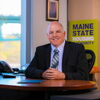Processing Your Payment
Please do not leave this page until complete. This can take a few moments.
- News
-
Editions
View Digital Editions
Biweekly Issues
- Nov. 17, 2025
- November 03, 2025
- October 20, 2025
- October 6, 2025
- September 22, 2025
- September 8, 2025
- + More
Special Editions
- Lists
- Viewpoints
-
Our Events
Event Info
Award Honorees
- Calendar
- Biz Marketplace
Remote work changes hiring strategies for some Maine law firms
 Photo / Tim Greenway
Michael-Corey Hinton is the leader of Drummond Woodsum’s expanded tribal nations practice group.
Photo / Tim Greenway
Michael-Corey Hinton is the leader of Drummond Woodsum’s expanded tribal nations practice group.
Maine law firms have made acquisitions, hired new talent and found opportunities to serve new clients throughout the pandemic. Some have found new ways to work remotely, others have returned to the office. Here are notable changes at some area firms.
Expansion at Drummond Woodsum
Drummond Woodsum in Portland has seen significant growth in the past year, and is now Maine’s second-largest law firm (see list on Page 26). In July, it merged with Germani Hill & Hayes to beef up its litigation practice. It also has expanded its environmental and natural resources practice, as well as its government and campaign relations group.
One unique expansion included adding two lawyers who live and work remotely from Arizona. Joe Sarcinella and Brian Lewis joined Drummond Woodsum’s tribal nations practice group this year as shareholders, expanding its client base and practice reach.
“It’s the first time the firm has hired workers from elsewhere without an expectation that they would move to Maine. It’s exciting. It would not have been possible pre-pandemic,” says Michael-Corey Hinton, leader of the firm’s tribal nations practice. “We’re the only law firm in New England with this type of practice.”
“The pandemic has been very hard. The growth of our business came from hardship suffered by our clients. It’s pushed all of us to do more and we’re just extremely grateful for the opportunity to do this work,” Hinton says.
Hinton knew Sarcinella and Lewis from law school at Arizona State University. He stayed in touch over the years and eventually recruited them to Drummond Woodsum.
“I knew they were in places in their careers where they could grow very, very fast. We said ‘Come work with us. We’ll give you administrative support. You can see your families more and work more effectively,’” Hinton says.
The practice group meets weekly by Zoom and handles clients from the eastern U.S. through to California, Washington, Arizona and New Mexico. The group includes seven lawyers who are dedicated to working with Tribal Nations or organizations that interact with them, and another 10 lawyers with other specialties in cannabis, financial issues or litigation provide additional help.
The firm sought to expand the practice to reach clients in other areas.
“We felt like there was a big swath of the country where we had great connections and opportunities to grow,” Hinton says.
The pandemic created a lot of opportunity for the firm because of new laws like the CARES Act and American Rescue Plan Act that injected trillions of dollars into the economy and created a lot of opportunities and questions for clients.
Bernstein Shur adds media-and-marketing practice
Following a move to add a practice group dedicated to climate-related law and regulation earlier this year, Portland-based Bernstein Shur now added another timely sector group called the media and marketing practice group. Bernstein is Maine’s largest law firm.
Headed by Bernstein Shur shareholder Kevan Lee Deckelmann, the group evolved out of client demand and need.
“As our world shifted from print and broadcast to celebrity, non-celebrity endorsements, texts, emailing, messaging and all that, our business had to evolve and move quickly,” Deckelmann says.
“It used to be that someone came up with an idea and an ad agency made a television commercial. Now, you can have an idea with a YouTube video in a day. Things move very quickly,” she adds.
The group helps clients learn how to do social media and marketing within the confines of regulations and advises them when there has been a misstep.
“There are a lot of questions about e-commerce and data collection, how to engage an endorser of a product, how and when to text consumers, how and when to send emails, what disclosures need to be on a product, marketing to children. It’s endless,” Deckelmann said.
The group handles clients locally, regionally and nationally.
“It’s hard for a client to be hyper-local any more. Once you ship products anywhere, you’re starting to have a national reach. So, we need to, as well,” Deckelmann said.
Deckelmann’s background is in mergers and acquisitions, but she evolved into a media and marketing expert due to client demand and need.
While the firm would normally have a launch event to showcase the group, the pandemic has made the rollout quieter. The group includes attorneys Matthew Saldana and Elliot Kelly.
Verrill expands trademark and trial areas
Following a strategic planning process to review areas of growth, Verrill added two trademark attorneys, as well as two trial attorneys.
The firm is targeting four key areas: intellectual property, health care, corporate and litigation, says Scott Anderson, a partner with Verrill.
“There’s a tremendous amount of lateral movement, not just in Maine, but nationwide. So, there’s a tremendous amount of talent and opportunity opening up to do lateral hiring,” Anderson says.
Verrill’s two new trademark attorneys are Thomas Dunn and Rebecca Lessard, and the new trial attorneys are Sarah Grossnickle and Martin Topol.
“We’re making smart, strategic growth. It’s growth in headcount, billable hours and revenue. We’re focusing on the practice areas that are growing,” Anderson says. “We’re focusing a lot on client teams that can support our biggest clients.”
The firm is focused on strengthening its presence in Portland, Boston and Westport, Conn. It also has an office in Augusta, as well as Washington, D.C., Rhode Island and New York.
While the firm works with clients nationally, it wants to work from its base in New England.
“What we experienced during COVID was a seamless transition to everyone moving home. Lawyers, staff, paralegals, all were productive and busy. Last year, we had some clients who were eager to resume face-to-face meetings, but now clients appreciate the flexibility of remote work,” Anderson says.
The pandemic made a lot of work simpler, such as attending an out-of-state court hearing or meeting a client in California via Zoom rather than flying across the country.
“It opened up opportunities, encouraging opportunities, to expand areas of practice that could be handled remotely,” Anderson says.
At the same time, remote work means competing with other law firms who also are working remotely.
“There’s more competition, which adds to the lateral switching,” Anderson said. “We just always have to be thinking of how to do a better job and to be constantly focused on clients.”
Pierce Atwood adjusts hybrid work balance
While some attorneys relish remote work, Pierce Atwood’s Nic Gladd missed an office environment. Gladd joined the firm in August due, in part, to a desire to be connected to a home base in Maine while he continued his work with energy clients nationally.
Gladd and his wife went to college in Maine and wanted to return. He was working remotely but wanted ties to an office and found a home at Pierce Atwood, says Jared des Rosiers, partner and chair of the firm’s energy practice group.
Prior to joining Pierce Atwood, Gladd was of counsel in the energy and infrastructure practice in the Washington, D.C., office of Kirkland & Ellis, a large international law firm.
“Prior to the pandemic, everyone worked at the office. Now, lots of lawyers are staying remote. Nic was a unique case in that he was remote before everyone else and found that the isolation can get old, that it’s helpful to be part of an office,” des Rosiers says.
“We’re very fortunate to have him. He adds and compliments our energy practice and helps clients all over the country — all from his chosen state of Maine,” des Rosiers says.
Preti Flaherty launches municipal broadband practice
Recognizing the importance of broadband service and the recent availability of new funding opportunities, Preti Flaherty recently formed New England’s first dedicated municipal broadband practice group.
Combining municipal, finance and telecommunications legal experience with knowledge of communications businesses and technologies, the group helps clients simplify and streamline the planning and implementation of telecommunications projects.
The group includes members of the firm’s municipal law and finance, energy and telecommunications and business law practice groups.
Kristin Collins, Joseph Donahue and Bonnie Martinolich are co-chairs of the municipal broadband group.
“The attorneys in our Municipal Broadband Group are trusted names in municipal, telecommunications, and business law. Central to our success is our depth of experience and nuanced understanding of the complex governmental and technological landscape. Formalizing our efforts into this first-of-its-kind practice group represents the latest responsive evolution of the innovative services clients have come to expect from Preti Flaherty,” Collins said at the time the practice was launched.
Mainebiz web partners
Related Content

The Giving Guide
The Giving Guide helps nonprofits have the opportunity to showcase and differentiate their organizations so that businesses better understand how they can contribute to a nonprofit’s mission and work.
Learn More
Work for ME
Work for ME is a workforce development tool to help Maine’s employers target Maine’s emerging workforce. Work for ME highlights each industry, its impact on Maine’s economy, the jobs available to entry-level workers, the training and education needed to get a career started.
Learn More
Groundbreaking Maine
Whether you’re a developer, financer, architect, or industry enthusiast, Groundbreaking Maine is crafted to be your go-to source for valuable insights in Maine’s real estate and construction community.
Learn more-
The Giving Guide
The Giving Guide helps nonprofits have the opportunity to showcase and differentiate their organizations so that businesses better understand how they can contribute to a nonprofit’s mission and work.
-
Work for ME
Work for ME is a workforce development tool to help Maine’s employers target Maine’s emerging workforce. Work for ME highlights each industry, its impact on Maine’s economy, the jobs available to entry-level workers, the training and education needed to get a career started.
-
Groundbreaking Maine
Whether you’re a developer, financer, architect, or industry enthusiast, Groundbreaking Maine is crafted to be your go-to source for valuable insights in Maine’s real estate and construction community.
ABOUT
NEW ENGLAND BUSINESS MEDIA SITES
No articles left
Get access now
In order to use this feature, we need some information from you. You can also login or register for a free account.
By clicking submit you are agreeing to our cookie usage and Privacy Policy
Already have an account? Login
Already have an account? Login
Want to create an account? Register
Get access now
In order to use this feature, we need some information from you. You can also login or register for a free account.
By clicking submit you are agreeing to our cookie usage and Privacy Policy
Already have an account? Login
Already have an account? Login
Want to create an account? Register










0 Comments